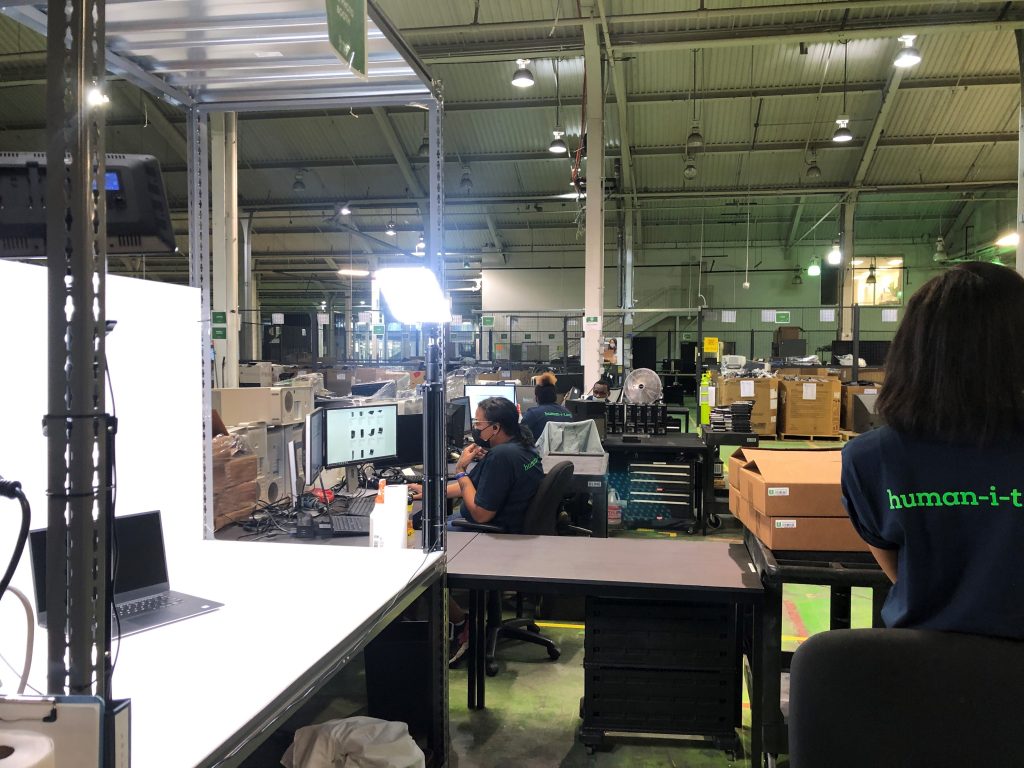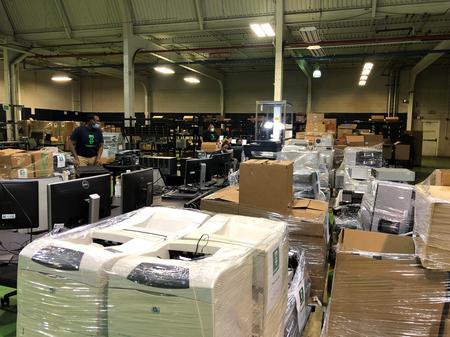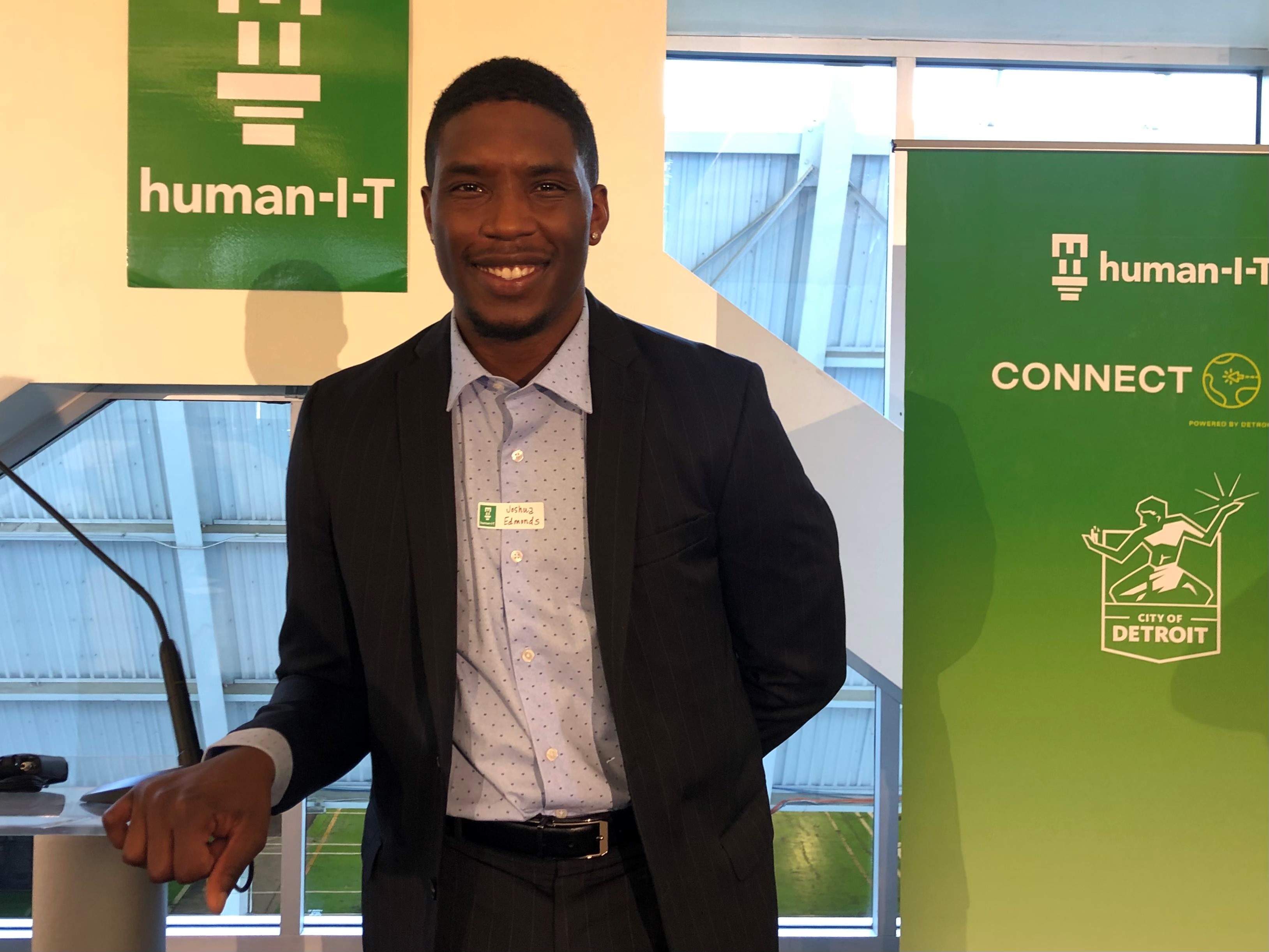The Digital Divide in Detroit: How the City is Working to Bridge the Gaps
Refurbished laptops, a $50 subsidy for internet bills and spending federal funds on Wi-Fi are on the agenda.

Detroit’s digital divide has challenged the city for years and during the pandemic, the need to access computers and the internet grew even more. Businesses and charities donated millions to give Detroit students computers and internet last spring.
And the effort to address the technological chasm continues.
Detroit is poised to receive $826 million from the American Rescue Plan Act and Mayor Mike Duggan is suggesting using $50 million to put laptops in the hands of students and improve internet connectivity around the city.
“What is happening in this world is people who have access to the internet have huge numbers of advantages. Students with access to the internet have enormous advantages over our students who don’t. People looking for jobs have enormous advantages. People who just want health care have enormous advantages,” said Duggan during a May presentation of the plan. “Internet connection has to be available for everyone, not just the well-off.”
City officials in Detroit are launching a four-month donation campaign to give residents refurbished laptops. human-I-T, a nonprofit located at Focus: HOPE, is leading the effort by taking donated computers and devices and refurbishing them. The nonprofit is hiring people to process discarded electronics rather than purchasing new technology.

“They just need a little bit of work and instead of just pulling from the ground,” said human-I-T co-founder James Jack. “We can actually just use what’s already here.”
City officials say before the COVID-19 pandemic, about 70% of Detroit’s children lived in homes without a wired broadband connection. Businesses and charities donated millions to give Detroit students computers and internet last spring. Amariah Wims-Fuller, 14, has been taking classes online during the pandemic.
“I’m glad that now that we’re getting adjusted and used to being online and how to deal with these technical difficulties,” said Wims-Fuller. “Everything is getting better than we first started out.”
As Detroit and the rest of the country brace for a new normal, city leaders like Joshua Edmonds, the city’s Director of Digital Inclusion, are still working to bridge those gaps.
“Governor Whitmer did sign an order creating the Office of High-Speed Internet,” said Edmonds. “And they made it a priority that they want to connect every single home and business in the state of Michigan.”
Listen: Joshua Edmonds talks about the local ecosystem working to bridge the gaps.

WDET’s Eli Newman spoke with Joshua Edmonds about the ways Detroit is helping its residents, like getting people free money to pay their internet bills from a $3 billion federal program called the “Emergency Broadband Benefit.” Read excerpts, edited for clarity, below:
Newman: What is the Emergency Broadband Benefit?
Edmonds: That is a free federal program — $50 a month off your internet bill. We really need people calling. We need to get that word out there because, on the back end of that, there’s currently legislation that’s being argued to create a permanent subsidy for Detroiters and for everyone around the country who’s struggling with internet access. If we are able to then demonstrate use on this emergency benefit in Congress, we can then use that ammo and firepower to actually bridge the digital divide in perpetuity.
In terms of this program, is this for all Detroiters, or is it based on income?
It’s not for all Detroiters, though a lot of Detroiters are going to qualify. The qualifications are very wide. For example, if you have a child in Detroit public schools, you qualify. If you are receiving any type of federal or state aid, you qualify or if you’re eligible for any of that. If you’ve experienced a significant loss of income, you qualify. I’m not going to say all Detroiters because I’d be on the record for saying that. However, I will say that it is a very large sum of Detroiters who are able to qualify for this program.
I’m scratching my head over the $3.2 billion fund. And I’m assuming there are no capacity limits for the city.
No capacity limits. There’s $3.2 billion. And that’s for the country. That’s not just for Detroit.
Honestly, I had no idea that was even a program.
No one does. It is something that, quite frankly, I am putting on the FCC because they did not put any money in for community engagement whatsoever. So they created this $3.2 billion program, no money for community engagement. This is us pulling our pennies together and robbing Peter to pay Paul to support this. I am not shy about this. This falls on the Federal Communications Commission. They needed, and they do need moving forward as they are proposing programs, to make sure they’re putting money in for community engagement because they cannot expect us in a city where we already have a litany of our own challenges to then dig deep in our pockets already for another thing.
Signups have, at least nationally, have not been as robust as they should be. And a lot of that has to do with not getting the word out. How do we get the word out? Through community engagement.
Radio broadcasts help sometimes, too.
We will be launching a radio broadcast on this, too. You’re going to hear radio commercials about this Emergency Broadband Benefit locally. I can’t speak for other communities across the state, I can’t speak for other communities across the country, but what I can say in Detroit, you’re going to see TV ads, you’re going to hear radio ads, all telling people to call that number.
“About 25 to 30% of Detroiters are not going to have internet of any kind. What that means specifically, that’s even looking at cellular data too. That’s the digital divide in the realest form.” –Joshua Edmonds, City of Detroit
I was just wondering if you could also just quantify that digital divide, at least that that broadband divide. How many households in the city do not have access to the internet?
We have snapshot data on that, so at a given time, you’re going to see, and this is based on the last five years, about 25 to 30% of Detroiters are not going to have internet of any kind. What that means specifically, that’s even looking at cellular data too. That’s the digital divide in the realest form. You’re going to see that across the country, too, in some of your most impoverished cities, at a 25 to 30% threshold. We’re not unique in that. However, where we are unique is in the ecosystem that we’re building here. You’re not going to find another Connect313. You’re not going to find this human-I-T setup with all these partners. That is a rarity, and the fact that we have that here, we can mobilize accordingly. We just so happen to have a local ecosystem that has been galvanized in a way where we’ve been able to fundraise for things like that to then further protect Detroiters as they’re engaging in these national programs. That’s kind of a representation of what we’re doing, but when looking at this digital divide 25 to 30%.
When you look at wired, high-speed internet, those numbers get a lot higher. That’s where you see that 40% number. I would also argue that if I’m a household and I just have my cellphone, then it doesn’t really matter because I do need that wired, high-speed internet. I would argue that most in this present day and age need that wired, high-speed internet, so that 40% figure is statistically significant.
In addition, prior to the pandemic, 46% of Detroiters did not have a desktop computer or a laptop. This kind of cosigns our efforts. I think that our efforts during the pandemic have helped significantly. 51,000 devices that we distributed through the Connected Futures initiative. 8,000 devices we did through the Connecting Seniors initiative. Another 7,000 devices we did for summer employment for youth. We’ve already have made tremendous strides, but we know we’re not over, and we’re going to continue doing this.
Along with that 40% statistic, one of the other things that I’ve seen is that 70% of kids don’t live in households with that wired, high-speed broadband. Do you think that’s an accurate figure?
I would say prior to that pandemic, yes. I think that there has been a lot of interventions that have been made throughout the course of this pandemic. I don’t want to say that we’re at 0%. I will say that figure has changed. I think that we’re going to be able to know at the end of this year when we finalize our data collection of how much impact did we actually have. How much have we changed the landscape? We know we changed it significantly, but again, we’re just trying to figure out how much that is.
“Our current understanding of the internet is really tied to a more corporate model, and that corporate model works enough in areas where people can afford it.” –Joshua Edmonds, City of Detroit
We’re talking about these big societal needs in terms of where that digital divide is, and we do have a number of people who are saying, maybe broadband is something that should be like a public utility that’s treated the same way that we treat water. Is that a possibility within the city of Detroit? Is that a feasible option?
I’m going to put this actually on the governor. It comes back to the Michigan Telecommunications Act. However, Governor Whitmer did sign about two weeks ago an order creating the Office of High-Speed Internet, and they made it a priority that they want to connect every single home and business in the state of Michigan. I think that by them articulating that point, that could be a possibility because, in order for us to connect every home and business, we need to think differently about how we think about the internet now. Our current understanding of the internet is really tied to a more corporate model, and that corporate model works enough in areas where people can afford it. But what happens when they don’t? I think that the state is going to have to figure something out in this because it created that office. They need to expand their thinking. But in any case, an Office of High-Speed Internet is great for our work in Detroit, and that very well could be a possibility.
Trusted, accurate, up-to-date
WDET is here to keep you informed on essential information, news and resources related to COVID-19.
This is a stressful, insecure time for many. So it’s more important than ever for you, our listeners and readers, who are able to donate to keep supporting WDET’s mission. Please make a gift today.
